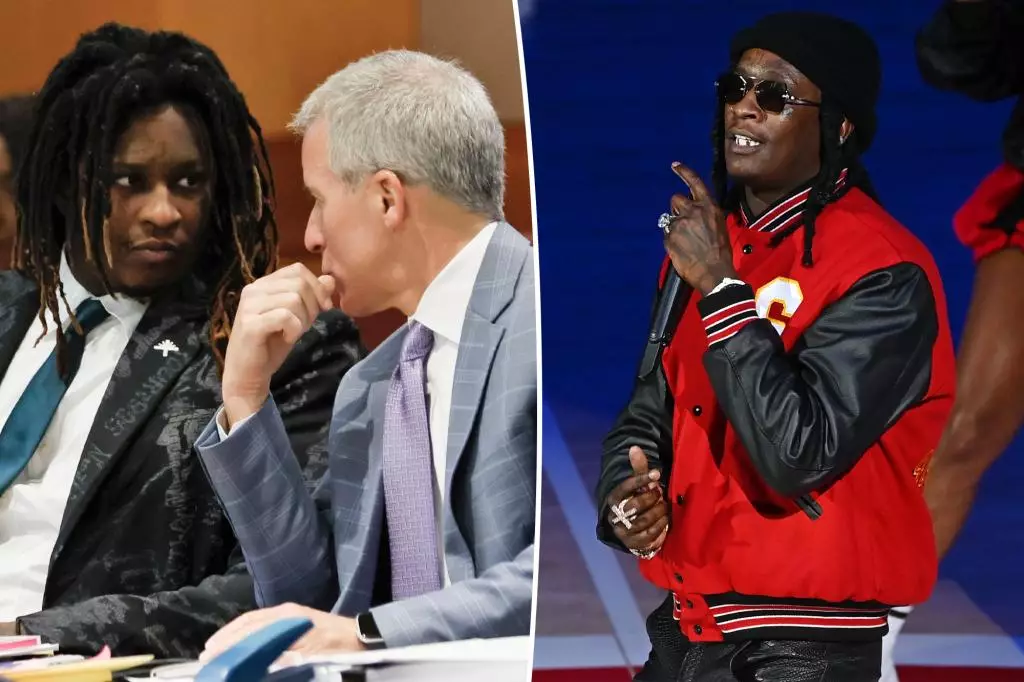Rapper Young Thug, whose real name is Jeffery Lamar Williams, has recently emerged from the tangled web of legal issues that have significantly impacted his life and career. After accepting a plea deal related to serious drug and gang charges, this monumental turn of events has concluded Georgia’s longest criminal trial to date. The multi-talented artist, known for his boundary-pushing music and unique style, faced grave allegations including racketeering and the leadership of a notoriously violent street gang. His decision to plead guilty to multiple charges, including three drug-related offenses, two gun charges, and one gang-related charge, marks not only the end of a protracted legal battle but also signals a crucial juncture in his life.
As part of the plea agreement reached on an Atlanta court, Young Thug will serve 15 years of probation—a substantial deviation from the potential prison sentence that could have reached a staggering 120 years had he been convicted on all counts. With over two years already spent behind bars, his release is a bittersweet victory that comes with stringent requirements. The artistic icon must complete 100 hours of community service each year and maintain a strict distance from the Atlanta area for the first decade of his probation. This includes only being allowed to return for monumental life events and leaving within 48 hours thereafter. Furthermore, Young Thug is mandated to conduct four anti-gang and anti-gun presentations annually in Atlanta, presenting a stark reminder of the consequences of gang affiliation.
Young Thug’s legal troubles have laid bare the complexities of gang culture and its implications within the music industry. Despite vehemently denying his role as the leader of Young Slime Life (YSL), prosecutors have argued that his success as a rapper is intertwined with the activities of the gang, which include violent crimes such as armed robbery and murder. This narrative surrounding his image raises difficult questions about the intersection of art and criminality, especially in a genre deeply rooted in storytelling drawn from real-life experiences. The charges against him exacerbate the stigma surrounding artists who draw inspiration from their backgrounds but are simultaneously held accountable for their connections to criminal organizations.
Despite the tumultuous legal landscape, Young Thug’s influence on music cannot be overstated. Since signing with Gucci Mane’s 1017 Records in 2013, Young Thug has redefined hip-hop with his avant-garde approach to sound and fashion. Recognized as a pivotal figure in the Atlanta rap scene, he achieved critical acclaim, winning his first Grammy for songwriting in Childish Gambino’s “This Is America” and earning multiple nominations since. However, the trials he now faces may overshadow his artistic accomplishments, posing a need for a shift in narrative that emphasizes not only his legal struggles but also his potential for redemption and influence as a mentor to younger artists.
As Young Thug begins this new chapter under probation, there lies a unique opportunity for growth and transformation. By engaging in community service and anti-gang initiatives, he may catalyze meaningful conversations about the realities of gang life and its impact on youth culture. The pressure to stay out of trouble adds further weight to his public persona, yet it also lays the groundwork for him to reclaim his narrative on his own terms. The context of his struggles can serve as a powerful testament to resilience, potentially allowing him to emerge from this legal maelstrom not just as a survivor but as an advocate for change. Ultimately, Young Thug’s journey reflects the complex interplay between fame, responsibility, and the pursuit of redemption.

